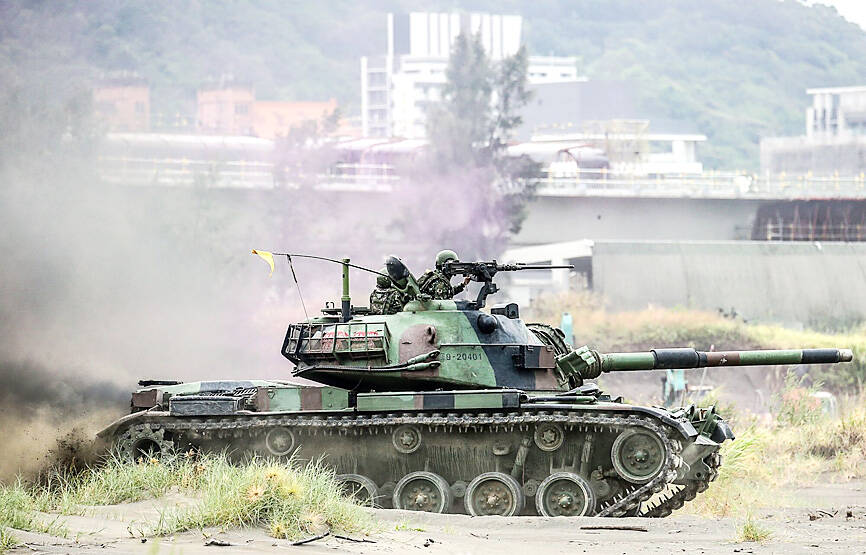The Executive Yuan has proposed NT$440 billion (US$14.02 billion) for defense spending next year, an increase of 7.5 percent from the previous year, a source said yesterday on condition of anonymity.
The figure includes an additional NT$30 billion — for purchasing M142 High Mobility Artillery Rocket Systems and M1A2T Abrams tanks, among other items — on top of policy-mandated defense spending of NT$400 billion, the source said.
The policy requires that annual defense spending not be lower than the average economic growth rate over the past three years.

Photo: I-hwa Cheng, Bloomberg
Adding the NT$49.27 billion in special budget funding for a program to enhance military capabilities, as well as NT$45.20 billion for acquiring new jets, to the total proposed budget expenditure, brings next year’s proposed military budget to NT$534.5 billion, a record high, the source said.
The Executive Yuan is expected to deliver its final version of the budget to President Tsai Ing-wen (蔡英文) early next month.
Tsai, who has been placing great emphasis on national defense spending, is expected to instruct the Cabinet to increase the budget, the source said.
The Executive Yuan is slated to pass a final version on Aug. 24 before forwarding it to the Legislative Yuan for approval, they added.
The source said that the nation’s total income for next year is expected to reach a record NT$2.7 trillion, growing 4.7 percent from this year, with tax revenue of NT$2.2 trillion.
Expenditures are expected to reach a record NT$2.88 trillion, up 6.7 percent from this year, they said.
Taiwan would run a deficit of NT$170 billion, they added.
The source said that the social welfare budget would likely increase 10 percent, or NT$77 billion, from last year’s NT$707.3 billion to NT$790 billion.
The majority of the funding, about NT$64.5 billion, would go toward the Laborer Insurance Fund, while NT$12.5 billion would go to a state subsidy program to help parents with newborns and children up to age 6.
The National Development Council asked for NT$207.3 billion and the National Science and Technology Council asked for NT$143.8 billion, while the Executive Yuan is considering increasing both agencies’ allotted funding by 10 percent over last year, the source said.
Most technology expenditures, an estimated NT$150 billion, would be used on developing zero emissions technologies for aerospace and next-generation communications networks, they said.
About NT$265 billion has been allocated for infrastructure, including NT$180 billion for construction projects and a special budget for the Forward-looking Infrastructure Development Program.

ENDEAVOR MANTA: The ship is programmed to automatically return to its designated home port and would self-destruct if seized by another party The Endeavor Manta, Taiwan’s first military-specification uncrewed surface vehicle (USV) tailor-made to operate in the Taiwan Strait in a bid to bolster the nation’s asymmetric combat capabilities made its first appearance at Kaohsiung’s Singda Harbor yesterday. Taking inspiration from Ukraine’s navy, which is using USVs to force Russia’s Black Sea fleet to take shelter within its own ports, CSBC Taiwan (台灣國際造船) established a research and development unit on USVs last year, CSBC chairman Huang Cheng-hung (黃正弘) said. With the exception of the satellite guidance system and the outboard motors — which were purchased from foreign companies that were not affiliated with Chinese-funded

PERMIT REVOKED: The influencer at a news conference said the National Immigration Agency was infringing on human rights and persecuting Chinese spouses Chinese influencer “Yaya in Taiwan” (亞亞在台灣) yesterday evening voluntarily left Taiwan, despite saying yesterday morning that she had “no intention” of leaving after her residence permit was revoked over her comments on Taiwan being “unified” with China by military force. The Ministry of the Interior yesterday had said that it could forcibly deport the influencer at midnight, but was considering taking a more flexible approach and beginning procedures this morning. The influencer, whose given name is Liu Zhenya (劉振亞), departed on a 8:45pm flight from Taipei International Airport (Songshan airport) to Fuzhou, China. Liu held a news conference at the airport at 7pm,

Taiwan was ranked the fourth-safest country in the world with a score of 82.9, trailing only Andorra, the United Arab Emirates and Qatar in Numbeo’s Safety Index by Country report. Taiwan’s score improved by 0.1 points compared with last year’s mid-year report, which had Taiwan fourth with a score of 82.8. However, both scores were lower than in last year’s first review, when Taiwan scored 83.3, and are a long way from when Taiwan was named the second-safest country in the world in 2021, scoring 84.8. Taiwan ranked higher than Singapore in ninth with a score of 77.4 and Japan in 10th with

GRIDLOCK: The National Fire Agency’s Special Search and Rescue team is on standby to travel to the countries to help out with the rescue effort A powerful earthquake rocked Myanmar and neighboring Thailand yesterday, killing at least three people in Bangkok and burying dozens when a high-rise building under construction collapsed. Footage shared on social media from Myanmar’s second-largest city showed widespread destruction, raising fears that many were trapped under the rubble or killed. The magnitude 7.7 earthquake, with an epicenter near Mandalay in Myanmar, struck at midday and was followed by a strong magnitude 6.4 aftershock. The extent of death, injury and destruction — especially in Myanmar, which is embroiled in a civil war and where information is tightly controlled at the best of times —